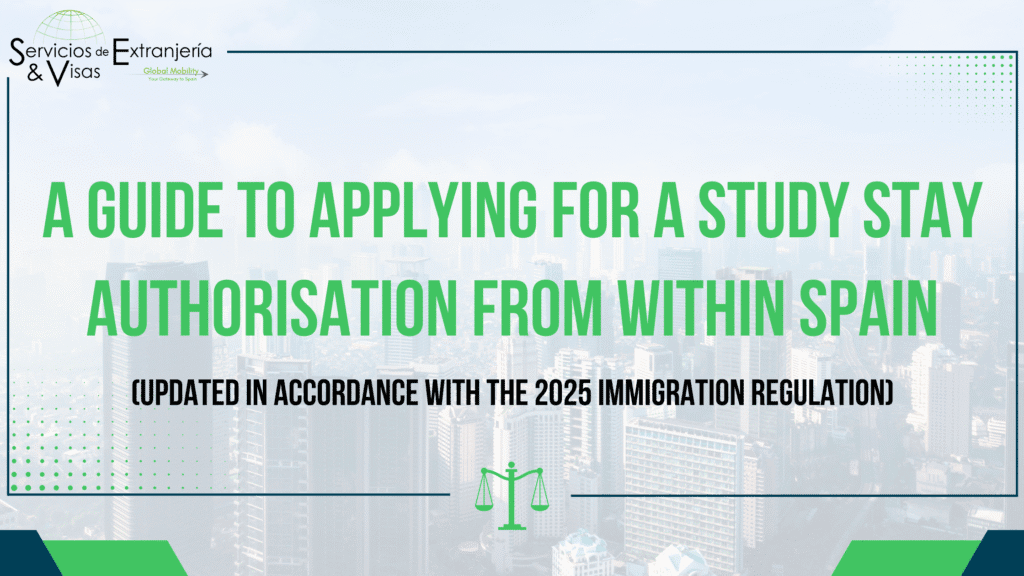A Guide to Applying for a Study Stay Authorisation from Within Spain

If you are a non-EU international student already legally in Spain — for example, on a tourist visa — you can apply for a study stay authorisation without needing to return to your country of origin. This possibility, governed by the new Immigration Regulation (RLOEX) in force since 20 May 2025, and by the SEM 3/2025 Instructions, makes it easier to start or continue your studies in Spain legally and safely.
This comprehensive guide explains the key requirements, benefits of the procedure, common mistakes, and how our firm Servicios de Extranjería can help you every step of the way. If you also need official translations, you can rely on our trusted partner, En Otras Palabras, for certified legal translations.
1) What is the Study Stay Authorisation from Spain?
This is an authorisation that allows you to legally reside in Spain for more than 90 days for academic purposes. Unlike the student visa, which is requested through a Spanish consulate in your home country, this authorisation is processed from within Spain, provided that you are already in the country legally. It is aimed at those accepted into a recognised educational programme, such as a university degree, a master’s programme, internships, or voluntary service.
This route is particularly useful for those who enter Spain for tourism or business and later decide to stay and study without returning home to apply for a visa.
2) The New Requirements of the 2025 Immigration Regulation – Step by Step
The updated RLOEX introduces key changes that directly affect international students. To be eligible for the study stay authorisation from Spain, you must be enrolled in an officially recognised public or private educational institution. Your enrolment must correspond to an official programme of higher education, vocational training, or any course approved by the relevant legislation — see the final table for examples.
You must also prove that you have sufficient financial means to support yourself during your stay. As a guideline, you’ll need to demonstrate at least 100% of the monthly IPREM (around €600/month), although this may vary depending on the length of your stay or whether you are applying with family members. Notably, the new regulation now allows income from internships or legal employment compatible with studies to count towards this requirement.
You must also hold private medical insurance with full coverage in Spain. For stays longer than six months, you’ll be required to submit a medical certificate and a criminal record certificate from every country where you’ve lived in the last five years. Both documents must be legalised or apostilled, and if not in Spanish, must be translated by a sworn translator. For this, you can rely on our translation service En Otras Palabras, specialised in official sworn translations.
One of the most relevant changes is the new timeframe for submitting your application. Previously, it had to be submitted within one month of entering the Schengen Area, and classes had to begin within two months of arrival. Now, the two-month rule before classes start still applies, but the application can also be submitted up to 60 days before the expiry of your legal stay in Spain. Submitting your application on time allows you to remain legally in Spain while your case is processed.
3) What Do the SEM 3/2025 Instructions Change?
The SEM 3/2025 Instructions clarify and supplement the new regulation. One of the most significant improvements is that the authorisation can now be granted for the full duration of your studies, which means no more yearly renewals — a big relief for degree, master’s or PhD students.
Compatibility between studying and working has also been strengthened: students in higher education may now work up to 30 hours per week without needing a separate work permit. This significantly enhances financial self-sufficiency during your stay.
Another key change is that family members (spouse or minor children) can now apply for their own stay authorisation as dependents, as long as they are legally in Spain and you can prove sufficient financial means. This enables family reunification without leaving the country.
Also, up to 50% of the academic programme may now be completed online or remotely, provided the remainder is in-person. This increases flexibility and access to hybrid study formats.
4) Required Documents to Apply for Your Study Authorisation
To apply for a study stay authorisation from within Spain, you must submit:
A valid passport (original and full copy of all pages).
Proof of legal stay in Spain (e.g., entry stamp, tourist visa).
Acceptance letter or proof of enrolment in an authorised institution, stating start and end dates.
Proof of financial means (at least €600/month), via bank statements, scholarships, or compatible contracts.
Private health insurance with full coverage in Spain.
Medical certificate and criminal record certificate (for stays over 6 months), legalised and officially translated (use En Otras Palabras).
Completed and signed EX-00 application form.
Payment receipt of the 790 form, code 052.
Recent passport-sized photograph.
The application may be submitted in person or online through Spain’s electronic registry. If approved, you may request your Foreigner Identity Card (TIE) at the National Police station
5) Common Mistakes That Could Get Your Application Rejected
One of the most common errors is missing the deadline — submitting your application too late can lead to immediate rejection. Another frequent issue is presenting documents without legalisation or without an official translation, which will result in denial. Many applicants also enrol in non-recognised study programmes, such as generic language courses that do not meet the legal criteria. You’ll find a summary of acceptable programmes in our final table.
At Servicios de Extranjería, we help you avoid these mistakes from the very beginning by reviewing every document thoroughly and handling your application with precision.
Final Thoughts: Start Your Academic Journey in Spain with Confidence
The new legal framework makes it easier than ever to begin your studies in Spain without a consular visa, provided you meet the deadlines and requirements. If you are already in Spain and wish to begin your academic path, this authorisation could be your ideal solution.
At Servicios de Extranjería, we are here to help you succeed — with efficiency, clarity, and commitment. Contact us today and start building your academic and professional future in Spain with the peace of mind that comes from expert legal advice.







